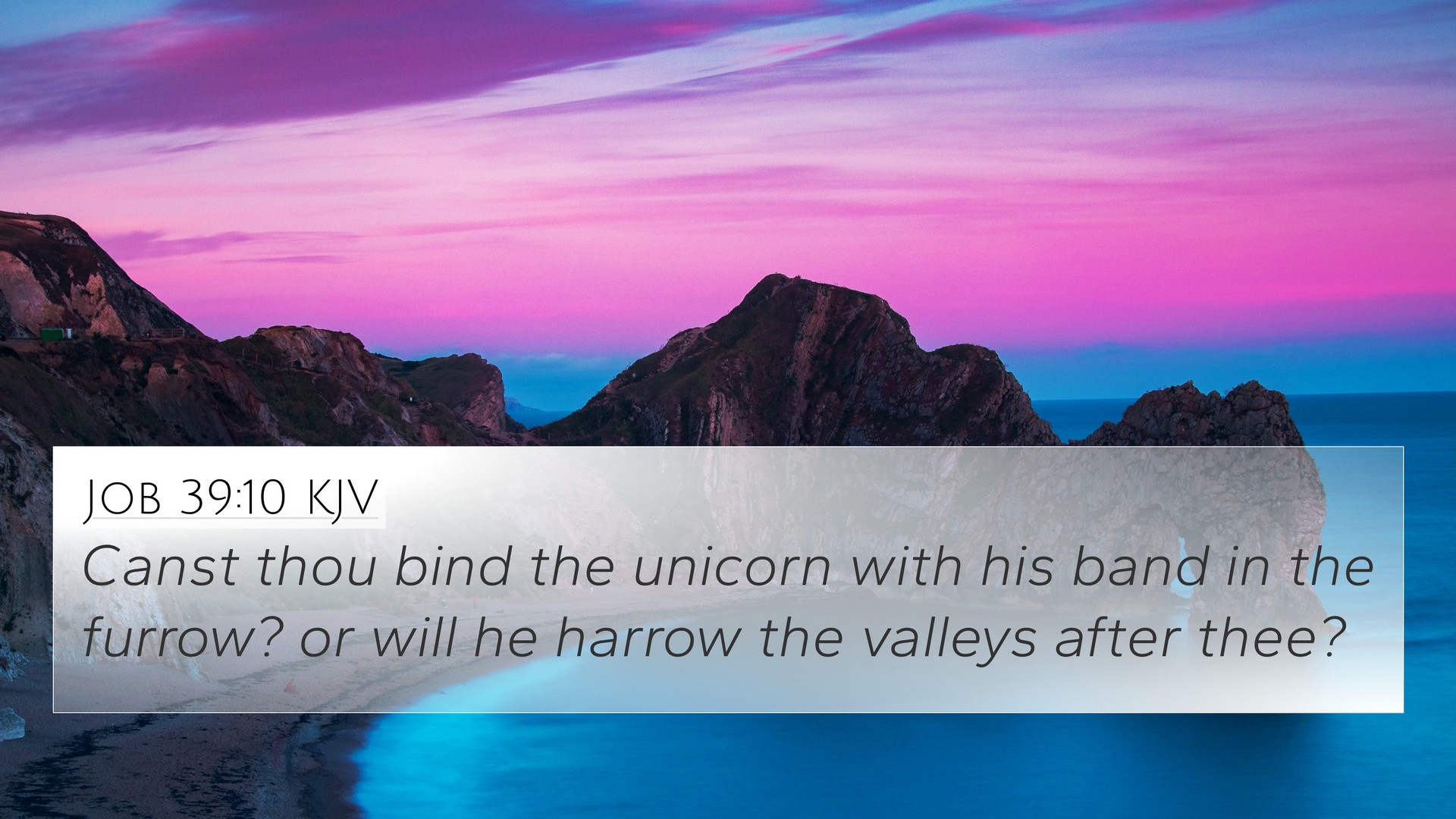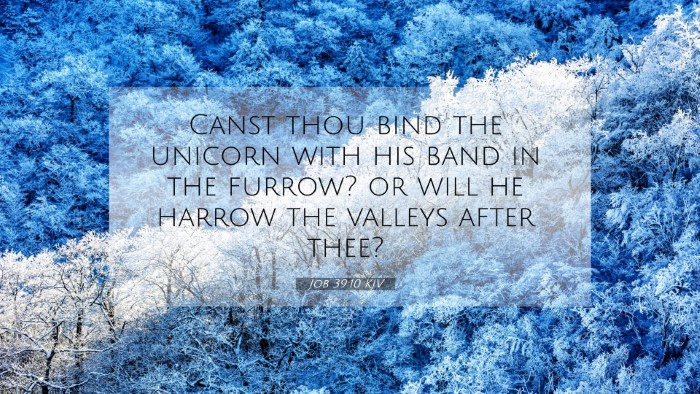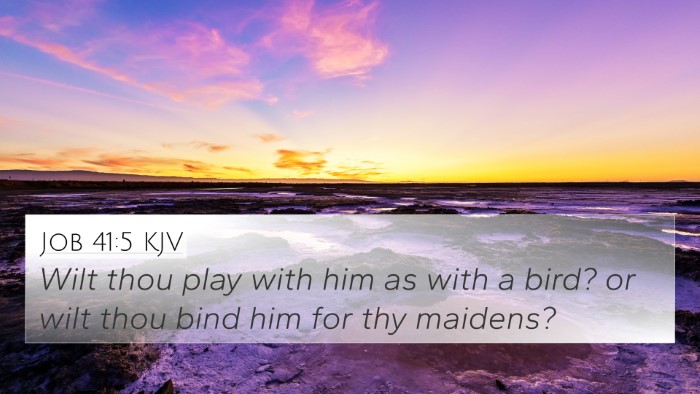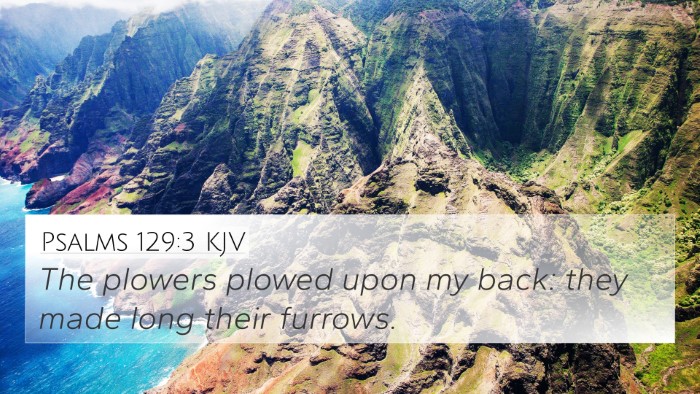Old Testament
Genesis Exodus Leviticus Numbers Deuteronomy Joshua Judges Ruth 1 Samuel 2 Samuel 1 Kings 2 Kings 1 Chronicles 2 Chronicles Ezra Nehemiah Esther Job Psalms Proverbs Ecclesiastes Song of Solomon Isaiah Jeremiah Lamentations Ezekiel Daniel Hosea Joel Amos Obadiah Jonah Micah Nahum Habakkuk Zephaniah Haggai Zechariah MalachiJob 39:10 Similar Verses
Job 39:10 Cross References
Canst thou bind the unicorn with his band in the furrow? or will he harrow the valleys after thee?
Uncover the Rich Themes and Topics of This Bible Verse
Listed below are the Bible themes associated with Job 39:10. We invite you to explore each theme to gain deeper insights into the Scriptures.
Job 39:10 Cross Reference Verses
This section features a detailed cross-reference designed to enrich your understanding of the Scriptures. Below, you will find carefully selected verses that echo the themes and teachings related to Job 39:10 KJV. Click on any image to explore detailed analyses of related Bible verses and uncover deeper theological insights.

Job 1:14 (KJV) »
And there came a messenger unto Job, and said, The oxen were plowing, and the asses feeding beside them:
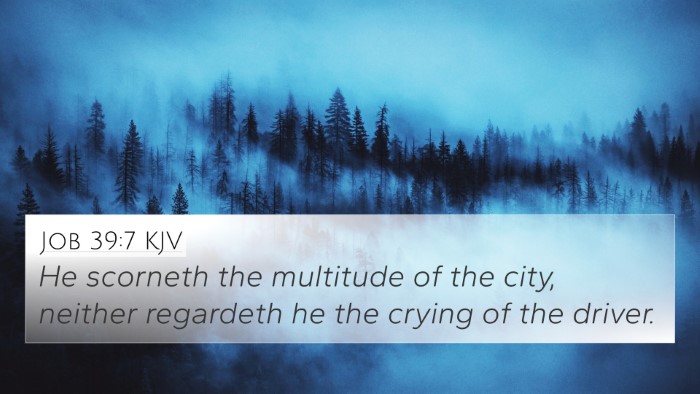
Job 39:7 (KJV) »
He scorneth the multitude of the city, neither regardeth he the crying of the driver.
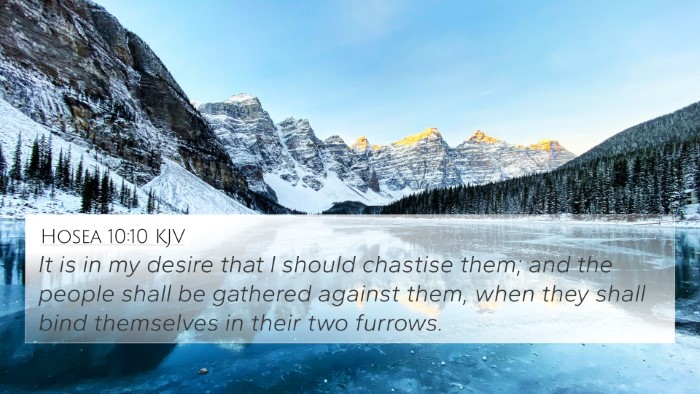
Hosea 10:10 (KJV) »
It is in my desire that I should chastise them; and the people shall be gathered against them, when they shall bind themselves in their two furrows.
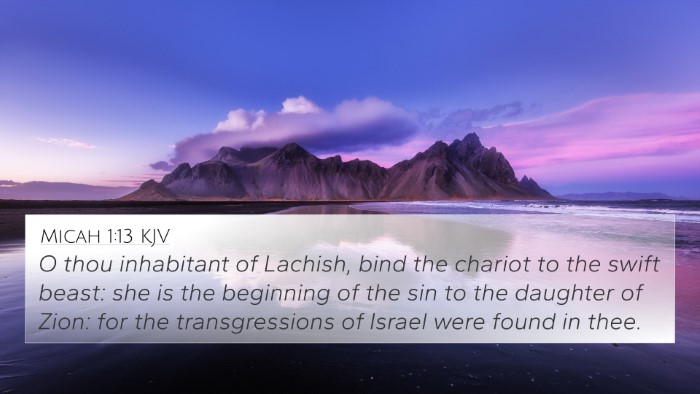
Micah 1:13 (KJV) »
O thou inhabitant of Lachish, bind the chariot to the swift beast: she is the beginning of the sin to the daughter of Zion: for the transgressions of Israel were found in thee.
Job 39:10 Verse Analysis and Similar Verses
Understanding Job 39:10
In Job 39:10, the text reads: "Can you bind the wild ox in a furrow, or will he harrow the valleys after you?" This verse, part of God’s discourse to Job, encapsulates themes of divine sovereignty and the limitations of human understanding and control over nature. Below is a detailed analysis, drawing from public domain commentaries.
Verse Context
This verse is embedded in a larger passage where God speaks to Job, reflecting on His creation and power. Job is being challenged to recognize the vastness and intricacy of God’s design in nature, contrasting with human limitations.
Commentary Insights
- Matthew Henry: Henry emphasizes that this verse illustrates God's power over wild creatures, portraying their untameable nature. It argues that even the mightiest of God's creations cannot be subdued by human efforts, highlighting the distinct roles of humanity and divinity.
- Albert Barnes: Barnes points out that the wild ox (like the unicorn in some translations) symbolizes strength and independence. The inability to control such a creature emphasizes the limits of human authority over the natural world and parallel's God's divine will.
- Adam Clarke: Clarke notes the rhetorical question posed in the verse, suggesting that God is prompting Job to consider the futility of trying to harness such a creature. This metaphor serves a larger purpose in the narrative, demonstrating humanity’s place in the grand schema of creation.
Thematic Applications
This verse has profound implications for understanding the themes of:
- Divine Sovereignty: A direct acknowledgment that God alone governs creation, reaffirming His omnipotence.
- Human Limitation: It suggests a reflective understanding of humans' inability to control all elements of the earth.
- Nature as God's Canvas: The wild ox, as a part of creation, is a canvas illustrating God's creativity and power.
Cross-References
This verse connects with numerous others throughout the Bible, allowing for enriched interpretation and understanding:
- Psalms 104:24-25: "O Lord, how manifold are your works! In wisdom have you made them all; the earth is full of your creatures." This emphasizes the complexity and the creation of God.
- Isaiah 40:12: "Who has measured the waters in the hollow of his hand?" This further emphasizes God’s control over creation.
- Proverbs 21:1: "The king's heart is in the hand of the Lord, as the rivers of water: he turns it wherever he will." A reminder of God's control over even the most powerful of men.
- Job 12:7-10: "But ask now the beasts, and they shall teach you; and the fowls of the air, and they shall tell you; or speak to the earth, and it shall teach you..." This links the discourse back to where Job himself is reminded of the wisdom found in creation.
- Jeremiah 27:5: "I have made the earth, the man and the beast that are upon the ground, by my great power..." A declaration of God’s sovereignty over creation.
- Romans 1:20: "For since the creation of the world God’s invisible qualities—his eternal power and divine nature—have been clearly seen." This reinforces the idea that God's attributes are evident in nature.
- Matthew 6:26: "Look at the birds of the air; they do not sow or reap or store away in barns, and yet your heavenly Father feeds them." This speaks to God's provision and care over all living things, similar to the wild ox of Job.
Inter-Biblical Dialogue
The interplay between this verse and others offers a rich tapestry for understanding God’s relationship with His creation and humanity’s place within it. Through these connections:
- Identifying Connections: By examining how various scriptures refer to themes of control and God’s omnipotence, readers can engage in thematic Bible verse connections that illuminate the nature of divine authority.
- Tools for Cross-Referencing: Utilizing resources such as Bible concordances or cross-reference guides, one can trace these themes across both the Old and New Testament.
- Cross-Referencing Bible Study: Engaging in methods that involve comparative Bible verse analysis deepens understanding and fosters greater insights into how different parts of the scripture dialog with one another.
Conclusion
Job 39:10 serves as a profound reminder of the majesty of God’s creation and humanity's limited place within that framework. The connections made through scripture enhance our understanding and appreciation of God’s sovereignty, inviting further exploration into the nature of divine power and human humility.
